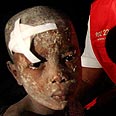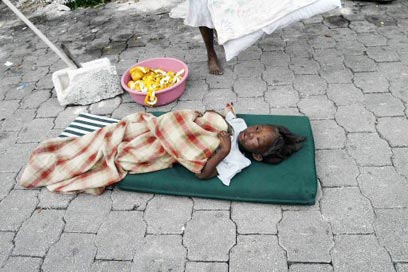
Israel will send a delegation to establish a field hospital in Haiti, Foreign Ministry spokesman Yossi Levy said Thursday.
The party sent to set up the hospital will include 40 doctors and 24 nurses, and is scheduled to leave Thursday evening. The hospital, capable of treating 500 patients, will include an intensive care unit, two operating rooms, a pharmacy, and an X-ray lab.
Search and rescue agents from the Homefront Command will also be included in the party.
Levy said a Home front Command delegation was currently making its way from the Dominican Republic to the quake-struck country.The number of victims resulting from the quake has not yet been announced. The Foreign Ministry has stated that all of the Israelis deemed missing after the disaster have been contacted but for Sharona Elsaieh, daughter of late peace activist Abie Nathan.
Two missing Israelis, a woman and her nine-year-old son, were found in good health on Wednesday. Another missing Israeli woman contacted her family on Thursday.
At around noon a Foreign Ministry delegation is expected to arrive in Haiti, while Israeli physicians and a rescue team will leave for the Caribbean country in the evening.

Photo: AFP
Deputy head of the Foreign Ministry's Latin America Department, Yossi Regev, said that Israel's ambassador to the Dominican Republic, Amos Radian, was in Haiti and that he would prepare to receive an Israeli aid party set to arrive later Thursday.
Meanwhile, US officials are laying out a massive military response to the Haiti earthquake, saying that ships, helicopters, transport planes and a 2,000-member Marine unit are either on the way or likely to begin moving soon.
One of the US Navy's large amphibious ships, the USS Bataan, was ordered to Haiti with a Marine expeditionary unit aboard. The ship is one of more than a half dozen, including frigates, a destroyer and a guided missile cruiser, being sent to the Caribbean nation.
Fraser said during a news conference with other US officials that the Pentagon is "seriously looking at" sending thousands of Marines to assist with disaster relief efforts and security in Haiti.
The dispatched troops would aim to keep the peace in the event of post-disaster unrest as part of a larger international effort overseen by the United Nations, whose peacekeeping operation headquarters was destroyed in the quake. About 100 UN personnel are believed to be trapped in the ruins of the building.
'Thirsty people are going to die'
President Barack Obama promised earlier Wednesday to mount an all-out rescue and humanitarian effort to help the people of Haiti overcome a "cruel and incomprehensible" tragedy."
The president said the relief effort is gearing up even as the US government is working to account for Americans who were on the island nation when the disaster struck late Tuesday afternoon.
Secretary of State Hillary Rodham Clinton cut short an extended trip to the Asia-Pacific region to deal with the earthquake crisis in Haiti, and Defense Secretary Robert Gates called off a planned trip to Australia where he and Clinton were to attend an annual summit.
Clinton told reporters in Hawaii on Wednesday that she would return to Washington to help oversee US relief efforts instead of continuing on to Papua New Guinea, Australia and New Zealand as she had initially planned.
There was no estimate on how many people were killed by Tuesday's magnitude-7 quake. Haitian President Rene Preval said the toll could be in the thousands. Leading Sen. Youri Latortue told The Associated Press the number could be 500,000, but conceded that nobody really knew.
In the streets of the capital Port-au-Prince, survivors set up camps amid piles of salvaged goods, including food being scavenged from the rubble.
"This is much worse than a hurricane," said Jimitre Coquillon, a doctor's assistant working at a makeshift triage center set up in a hotel parking lot. "There's no water. There's nothing. Thirsty people are going to die."
If there were any organized efforts to distribute food or water, they were not visible Wednesday.
The aid group Doctors Without Borders treated wounded at two hospitals that withstood the quake and set up tent clinics elsewhere to replace its damaged facilities. Cuba, which already had hundreds of doctors in Haiti, treated injured in field hospitals.
Roni Sofer and AP contributed to the report















